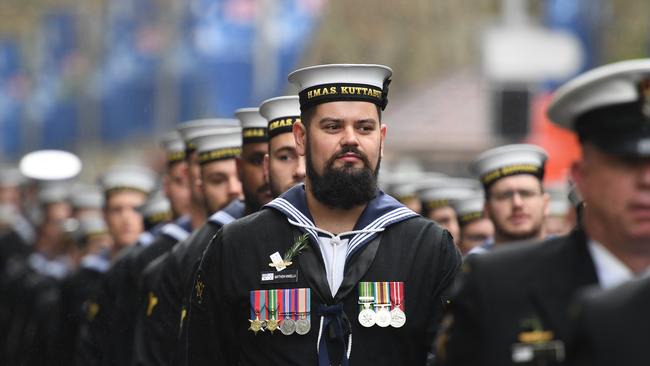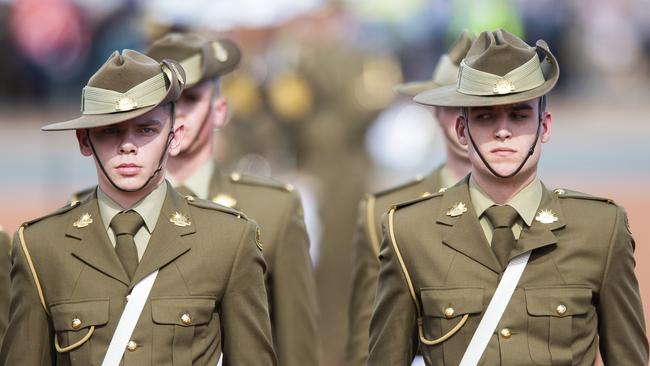Our Anzacs’ fight for freedom is still raging
THE point of memorial days is to consider the negative impact of war on everyone. The general public are all brought together in a solemn, sad service to quietly reflect and thank those who did the extraordinary, writes Karen Brooks.
Rendezview
Don't miss out on the headlines from Rendezview. Followed categories will be added to My News.
WHY is it that every Anzac or Remembrance Day, someone in the public eye makes comments that enrage the masses?
Last week, comedian and writer, Catherine Deveny decided it was her turn. In a deliberately provocative move, Deveny not only chose to call Anzac Day “bullshit” and “f**king disgusting”, declaring it functions as a “Trojan horse for racism, sexism, toxic masculinity, violence, homophobia and discrimination”, she then collectively slated all servicemen and women. She wrote, “Why do people in the armed forces use the word “serve” to describe their work despite it being no more dangerous or prone to upheaval than many other jobs? It’s just a job and work…”
“Just”?
Shortly, I will address why Deveny is completely wrong about this. As she no doubt anticipated, the outrage that followed was swift and brutal. While most responded by sharing their own or family’s service throughout many campaigns, there were those who posted insults and threats — including rape. Then there were those who used Deveny’s insightless comments to (yet again) attack Yassmin Adbel-Magied and others, conflating the latter’s consciousness-raising “Lest We forget (Manus)” post with Deveny’s ignorance and slights.
This is deeply unfair. Surely, one of the reasons people join the armed forces is to prevent the very thing Manus Island represents? The ferocity with which people attacked those who call on us to reflect more broadly about the effects of war mostly reveals a myopic and precarious patriotism.

The point of memorial days is to consider the negative impact of war on everyone. This is what I witness every Anzac Day as ex-service men and women of all colours and creed, current members, their families — including children — the general public, are all brought together in a solemn, sad service to quietly reflect and thank those who choose (unless conscripted) to do the extraordinary. It’s incredibly moving, peaceful and powerful.
This doesn’t “glorify” war or contribute to the culture of violence — on the contrary, it reminds us of how deadly and damaging they are. Later, for those inclined, there are celebrations and camaraderie.
As regular readers will know, I served five years full-time as an army officer in the Defence Forces. I can tell you, it isn’t “just a job”. Armed service personnel do “serve” — there’s no other term more appropriate. Their work, while sometimes involving a 9-5 style desk job is very different to the everyday demands of routine employment (police and emergency services exempted).
What regular job requires competent handling of a range of weapons? Or skills in camouflage or driving a range of vehicles over diverse terrains? What job demands a consistent high level of fitness? To ensure this, there’s dedicated sport, PT (physical training) hours and days every week and stringent objectives that must be satisfied. Once a week, soldiers are often required to do “battle PT” — exercise with full pack and weapon. When on active service, they carry a weapon at all times — even to the toilet.

As for “being (no more) prone to upheaval”, with only short or sometimes no notice soldiers are required to join manoeuvres, leaving family for periods that can be indefinitely extended. Regiments can go into lockdown and simulate war situations, inducing sleep deprivation and high stress, training their soldiers to endure all sort of environments that bear no resemblance to civilian life. And that’s before we consider what active service requires of our brave men and women: sacrifice — of family, community, country, ability to freely communicate, physical comforts we take for granted, health, emotions, and sometimes life.
Whenever there’s a natural disaster, it’s the armed forces who are called to help by ensuring people are safe, providing basic provisions and restoring ravaged communities — 24/7. These are just some examples.
How is this not “serving”? How is this not dangerous? Soldiers die when in training as well. Furthermore, when a soldier quits the forces, they can be recalled within five years to serve again. Especially if there’s a shortage in their specific trade or talent.
While I agree with Joe Hildebrand’s excellent riposte to Deveny, one where he points out the many inaccuracies in her outburst, I too will defend her right to say these things — as much as they stick in my craw. This is what our men and women fought and continue to fight for as well: our freedom which includes free speech as unpalatable as some of it might be. Unlike the soldiers of past and present, Deveny’s rant served nothing except to draw attention to herself, divide, incite anger, sadness, hatred and disgust.
Exactly what our service men and women fight to end. Lest We Forget.
Dr Karen Brooks, Honorary Senior Research Consultant, IASH, University of Queensland.


